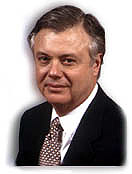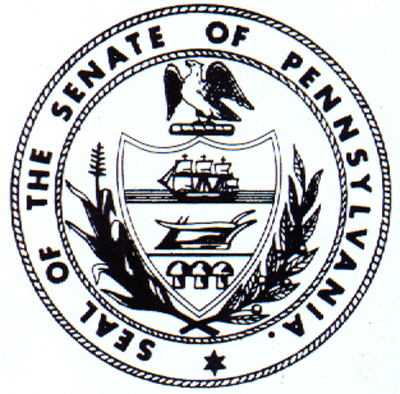|
|
||||||
FUMO SEEKS TO ENSURE OPEN CONSIDERATION OF LEGISLATION HARRISBURG, December 14, 2005 – Declaring that the time is overdue to halt "sneak" legislation, and to guarantee greater opportunity for public participation, state Senator Vince Fumo (D-Philadelphia) said today that he intends to propose a series of constitutional amendments that will alter the way the Pennsylvania General Assembly considers and approves legislation. The reforms, designed in consultation with the public interest lobby Common Cause, are intended to ensure public notice of legislation being considered, public input before a bill passes the House or Senate, and public enforcement if the General Assembly violates any of those principles. The broadest provision would prevent any bill from passing a chamber unless it has been on the calendar at least 72 hours, in its final form as amended by that body. Focusing on public input, two other proposals would increase opportunities for hearings. Under the first, 10 percent of the elected members of the either the House or Senate could require a public hearing on the final version of a bill, as amended, before it is brought up for final passage. Under the second, no bill on concurrence could be amended as to change the scope of its original purpose, unless, prior to passage, the bill, as amended, has been subject of a public hearing. The proposals would also give any adult resident of the Commonwealth legal standing to challenge the manner in which a bill has been considered and passed, and would state that any bill passed in violation of these legislative mandates is void. "If citizens are to have confidence in the work we do here at the Capitol, they must know that their elected representatives are taking the time to study and understand legislation before casting a vote," Fumo said. "I recognize this will require changes to our customary way of doing business, and will require us to plan ahead a little more, but I believe it will be a change for the better," he added. "When enacted, these reforms will help Pennsylvania government better serve our citizens in a variety of ways," said Barry Kauffman of Common Cause. "...These reforms will permit representatives to better understand measures on which they vote; have time to consult with trusted experts and constituents; more fully prepare, propose and deliberate options; and have better opportunities to influence the outcome of legislation." Fumo plans to introduce his proposals as statutes so that they take effect immediately after passage. He will also introduce identical legislation as constitutional amendments, which would have to be approved by two separate sessions of the legislature and then be approved by voters in a referendum. The earliest that could happen would be spring of 2007. Currently, the state Constitution requires that any bill must be considered in each chamber on three separate days before final passage. Frequently, however, the process circumvents that requirement through the use of amendments. Commonly, a bill receives the required three days of consideration on the calendar in each chamber. Then at the 11th hour, often in the Rules Committee or on the floor, its original language is removed or significantly modified, and it is "amended" with completely new legislation. The House or Senate then calls up the new version of the bill and passes it shortly afterward. The legislative, executive and judicial pay raises enacted in July of this year were approved through the use of this amendment process. Often, the most significant and most controversial pieces of legislation receive such treatment -- exactly the types of bills, Fumo said, which should be subject to the most intense scrutiny from lawmakers and the public alike. Fumo’s series of reforms would prevent such use of last-moment amendments by establishing a set of time frames for the consideration of a bill whenever its content is altered. In addition to the broad provision requiring that no bill could come to the floor for final passage for at least 72 hours after it has been amended, his plan also: Requires that no bill be passed by a committee unless it has been considered for at least 24 hours after being amended. Requires that all amendments be printed, posted, and all members of the General Assembly be notified, at least 24 hours prior to any vote on that amendment. Requires that any bill that expends state or local government funds, or which costs state or local government revenue, be considered by the Appropriations Committee in its final form as amended before being sent to the floor for final passage. Another provision would compel each chamber to post its Legislative Journal on the Internet within 20 days of the particular session day, and to post each vote taken within 24 hours. "The pay raise has brought public focus on the legislative process, but this has actually been a problem for quite some time," Fumo said. "I complained about it ten years ago regarding the budget, and more recently concerning passage of the electric deregulation bill, the state takeover of the Philadelphia Parking Authority and other issues. I hope my colleagues, the news media, and the public will now pay attention to the problem and work at inserting a solution into the Constitution." In 1995, Fumo joined Common Cause in support of its successful challenge to the enactment of the state General Fund Budget. In 1998, he went to court to challenge the Electric Deregulation Act that passed in 1996. According to Fumo, the problem is worst when there is one-party rule in the legislature and governor’s office. The minority party often suffers the same disadvantage as the public at large, learning of proposed legislation written by the majority party only at the last minute. "No doubt, my proposals would allow the minority party to be more involved in the process and be more aware of legislation about to be considered," Fumo said. "Just because it helps the minority, however, does not change the fact that it is also in the public interest. "In fact, I would argue that those interests are related. Those of us in the minority party were elected by the voters throughout the commonwealth, too. Those citizens have the right to have their voices heard in Harrisburg, and to have their elected representatives make informed decisions." Fumo said he will formally introduce the proposals early in 2006. He thanked Kauffman, who appeared with him today at a press conference announcing the plan, for the input Common Cause provided. "I am pleased to have the support of Common Cause for these proposals, and I am grateful that they offered their suggestions. I recognize that Common Cause, as well as other groups and other legislators, have many other ideas for changes to the legislative process. Many of these ideas are worthwhile and deserve serious consideration. The proposals I am making today are intended to attack several of the most glaring flaws that I see in the process by which we pass legislation," Fumo said.
# # # |


